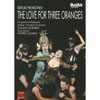Prokofiev (The) Love for Three Oranges
The comedy might misfire but this Oranges has fine singing and playing
View record and artist detailsRecord and Artist Details
Composer or Director: Sergey Prokofiev
Genre:
DVD
Label: Bel Air Classiques
Magazine Review Date: 12/2007
Media Format: Digital Versatile Disc
Media Runtime: 112
Mastering:
Stereo
DDD
Catalogue Number: BAC024

Tracks:
| Composition | Artist Credit |
|---|---|
| (The) Love for Three Oranges |
Sergey Prokofiev, Composer
Alexander Gerasimov, Farfarello, Bass Alexey Tanovitsky, King of Clubs, Bass Andrey Ilyushnikov, Prince, Tenor Eduard Tsanga, Leandro, Baritone Ekaterina Shimanovitch, Fata Morgana, Soprano Ekaterina Tsenter, Smeraldina, Mezzo soprano Europa Academy Chorus Juan Noval, Master of Ceremonies, Tenor Julia Smorodina, Ninetta, Soprano Kirill Dushechkin, Truffaldino, Tenor Mahler Chamber Orchestra Michel Fau, Diva, Vocalist/voice Nadezhda Serdjuk, Princess Clarissa, Contralto (Female alto) Natalia Yevstafieva, Nicoletta, Mezzo soprano Pavel Schmulevich, Celio, Bass Sergey Prokofiev, Composer Sophier Tellier, Linetta, Contralto (Female alto) Tugan Sokhiev, Conductor Vladislas Sulimsky, Pantalone, Baritone Wojciek Ziarnik, Herald, Bass Yuri Vorobiev, Cook, Bass |
Author: David Fanning
Here is an Oranges sung in Russian as originally composed, rather than in the (equally authentic) French of the first productions and of the rival DVDs. Perhaps because the language itself darkens some vowels and prolongs certain consonants, the
text acquires a completely different shade, and it seems natural that Philippe Calvario's production should come across as rather less frivolous than most. Also, since the audience
is Francophone, the verbal comedy makes less effect than it might.
That is also partly the fault of the production, which misses the point of the “spectacles” that fail to make the hypochondriac Prince laugh: which is not that they should be feeble and unfunny, as here, but that they should make everyone apart from the Prince fall about. Several important tricks of this kind are missed.
Still, the comic element is no less strong than in the two rival versions, partly because the sets and costumes are fun and the stage movement quite good (not least from the chorus), partly because the Lyon and Netherlands productions are so poor in those respects, and partly because Tugan Sokhiev paces and colours the score at least as idiomatically as Nagano and far better than Denève, while his orchestra is by some distance the best of the three. There may not be any star names in the mainly Russian cast, but they all have strong voices and look confident on stage. So there are substantial musical compensations for the less than wonderfully realised comedy, and among those compensations is a greater than usual sense of the aggression and nastiness under the surface of the story.
The sound and visuals are as good as anything I have encountered on DVD; even the sound of the crickets is captured (or so it seems), lending atmosphere to the open-air theatre of the Aix-en-Provence Festival. Though it would not be hard to imagine a more effective production on the comic side, if you simply can't wait for anything better to come along - or if you would like to add a Russian-language version to your collection - then you have here a version that is finely sung and played, and one that brings out more undertones in the score than you might have suspected were there.
That is also partly the fault of the production, which misses the point of the “spectacles” that fail to make the hypochondriac Prince laugh: which is not that they should be feeble and unfunny, as here, but that they should make everyone apart from the Prince fall about. Several important tricks of this kind are missed.
Still, the comic element is no less strong than in the two rival versions, partly because the sets and costumes are fun and the stage movement quite good (not least from the chorus), partly because the Lyon and Netherlands productions are so poor in those respects, and partly because Tugan Sokhiev paces and colours the score at least as idiomatically as Nagano and far better than Denève, while his orchestra is by some distance the best of the three. There may not be any star names in the mainly Russian cast, but they all have strong voices and look confident on stage. So there are substantial musical compensations for the less than wonderfully realised comedy, and among those compensations is a greater than usual sense of the aggression and nastiness under the surface of the story.
The sound and visuals are as good as anything I have encountered on DVD; even the sound of the crickets is captured (or so it seems), lending atmosphere to the open-air theatre of the Aix-en-Provence Festival. Though it would not be hard to imagine a more effective production on the comic side, if you simply can't wait for anything better to come along - or if you would like to add a Russian-language version to your collection - then you have here a version that is finely sung and played, and one that brings out more undertones in the score than you might have suspected were there.
Discover the world's largest classical music catalogue with Presto Music.

Gramophone Digital Club
- Digital Edition
- Digital Archive
- Reviews Database
- Full website access
From £8.75 / month
Subscribe
Gramophone Full Club
- Print Edition
- Digital Edition
- Digital Archive
- Reviews Database
- Full website access
From £11.00 / month
Subscribe
If you are a library, university or other organisation that would be interested in an institutional subscription to Gramophone please click here for further information.




